Eddie McGuire explains his biggest controversies as Collingwood president
Eddie McGuire fought the AFL on salary cap and cost of living concessions in the early 2000s and says it was “to his detriment”.
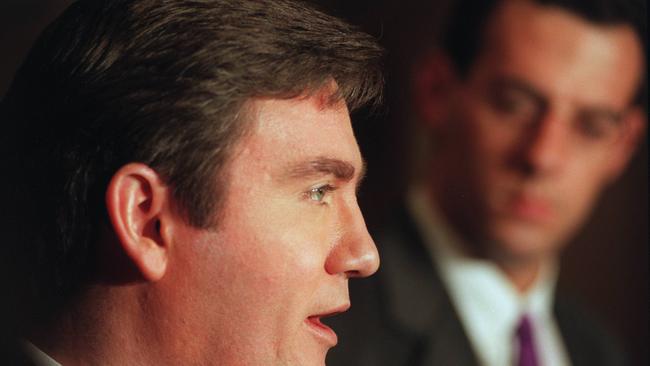
Collingwood
Don't miss out on the headlines from Collingwood. Followed categories will be added to My News.
When Eddie McGuire reached 20 years as Collingwood president in 2018, he spoke with Glenn McFarlane about the highs and lows of his reign.
Here are his thoughts on some of the biggest issues from his time in charge.
THE DECISION TO CHASE THE PRESIDENCY
It was Round 21, 1998, and McGuire was calling for Triple M — through gnashed teeth — as Carlton trounced his beloved but ailing Collingwood.
His frustration mirrored a Magpie fan he observed outside the radio box, who yelled out: ‘F--- Collingwood’.
“He wasn’t a fair-weathered supporter; he was one of us,” McGuire recalled. “I was thinking ‘I know how you feel mate’.
RELATED: THE CONTENDERS FOR EDDIE’S JOB
“Absolute patriots of the club such as Kevin Rose were doing everything possible for the club.
“This might sound melodramatic, but the AFL was looking to put teams out of business or merge them at the time. I’d broken some of the big merger stories.
“The game was moving at hyper-speed. At that stage, every year you were going backwards seemed to be worth five.
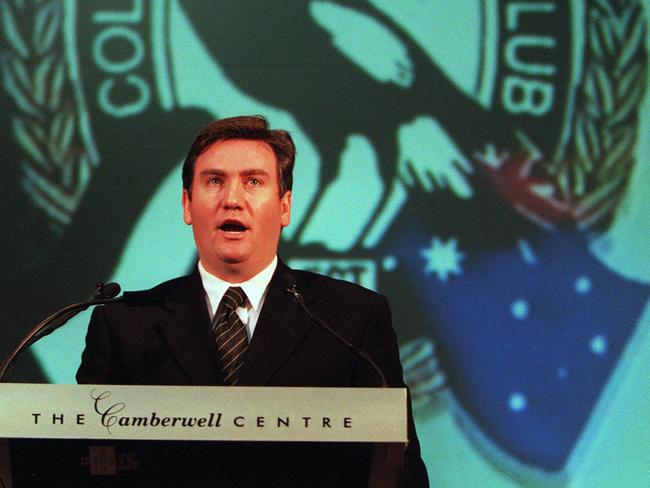
“I thought if this ever happened to Collingwood, if I hadn’t done anything to help, I would never forgive myself. I thought, ‘if I ever have boys, and they asked me who I barracked for, and I said ‘Collingwood had gone the same way as Fitzroy and University’, I would never forgive myself.”
On the night of his 34th birthday — October 29, 1998 — McGuire was elevated to the presidency in a bloodless coup.
His two sons, Joseph and Alexander, have only known him as Pies president and have ridden much of the journey with him.
GRAND FINALS LOSSES, 2002-03
Against the odds, after winning a wooden spoon in McGuire’s first season as president, Collingwood played off in successive Grand Finals in new coach Mick Malthouse’s third and fourth seasons, losing to Brisbane by nine and 50 points.
“We didn’t win the flag (in 2002), but we were so unlucky,” McGuire said.
“I still have nightmares about (Anthony) Rocca’s ‘goal’ (which was called a behind). I was right behind it, and it was a goal.
“One of the Scott brothers broke (US 1968 Olympic gold medallist) Bob Beamon’s long jump record jumping over the mark to touch Chris Tarrant’s goal … that would have been one of the greatest Grand Final wins in history (if Collingwood had won).
“In 2003, the boys played out of their skins to get to the Grand Final, and Brisbane said they had syringes in the medical room up to their knees, all that sort of stuff.”
Kayo is your ticket to the best sport streaming Live & On-Demand. New to Kayo? Get your 14-day free trial & start streaming instantly >
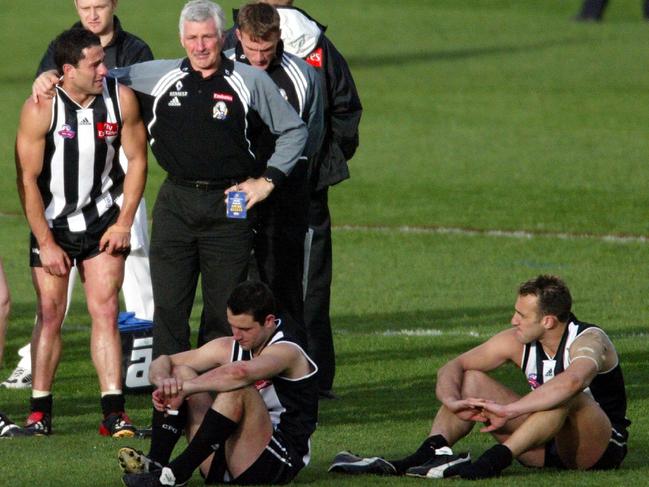
THE MOVE TO OLYMPIC PARK, 2004
Collingwood played its final AFL game at Victoria Park in 1999, but remained at its traditional home until 2004 before shifting to the state-of-the-art Olympic Park training and administration base.
“Ultimately, we’ve been able to have three wonderful pillars of the club,” he said in 2018.
“There’s Victoria Park, which Collingwood did a deal with the Federal Government for $10 million to fix it up. We’ve helped make it a grassroots community centre, and it will hopefully be used for women’s games and under 18s/16s games.
“There’s the Holden Centre which has become the No.1 centre for excellence, and we have some really big plans for the future.
“Then, there’s the MCG, the best ground in the world to play on with the best facilities for our supporters.”
GOING TO WAR WITH THE AFL
McGuire was the most vocal opponent of the salary cap concessions for Brisbane and cost of living allowances for Sydney, declaring himself at “war” with the AFL in the early 2000s.
“I did that to my own detriment,” he said.
“There might be a couple of chapters for a (future) book I am not prepared to talk about yet.
“There were big threats … not death threats. Certainly, there were people going flat out to get me. But that’s OK. You play a hard game, we’re not shrinking violets.”
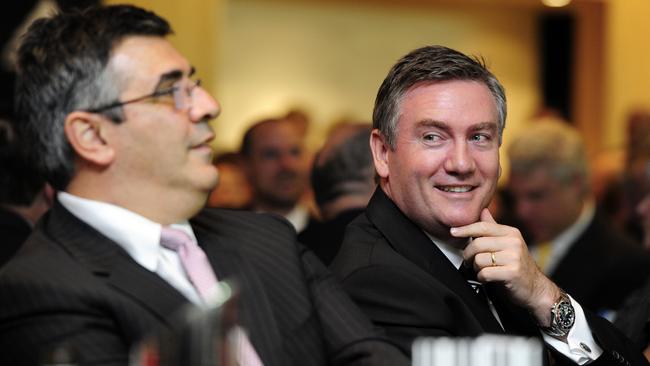
OFF-FIELD PLAYER INDISCRETIONS
“When I first started, I thought we were trying to build utopia, then you realise life in a footy club is a microcosm for the wider society,” McGuire said.
“I learnt that in trying to turn back the tide, you can only do the best you can to help.
“It doesn’t mean you don’t give them a good beating every now and then. I am a father of two, but it feels like I am a father of 200.”
But he insists there are “mitigating circumstances these days.”
“You can’t get at your players (much) these days. I think the AFL and the AFLPA do a reasonable job on that, but I think we need to have a look at it again.”
COACHING SUCCESSION DEAL, 2009
Few off-field moments in Collingwood’s history have caused as much debate as the 2009 coaching succession plan.
McGuire negotiated two more years for Malthouse after 2009, then three more as director of coaching. Buckley was to be an assistant for two years before assuming the coaching mantle in 2012.
The only problem was Malthouse changed his mind, quitting after the 2011 Grand Final.
“People seem to forget the first conversation was with Mick Malthouse’s manager Peter Sidwell,” he said.
“Both of us had Mick’s best interests and his family’s best interests at heart. Later on … they believed (it) wasn’t in their best interests, but at the time it was, because of numerous things.
“It was all go, until it wasn’t. We didn’t air our dirty laundry, which was unusual for a footy club. Mick was a great servant of the Collingwood Football Club.
“Bucks at one stage considered standing out for a year (in 2012), I said ‘No’. We had made the decision.”
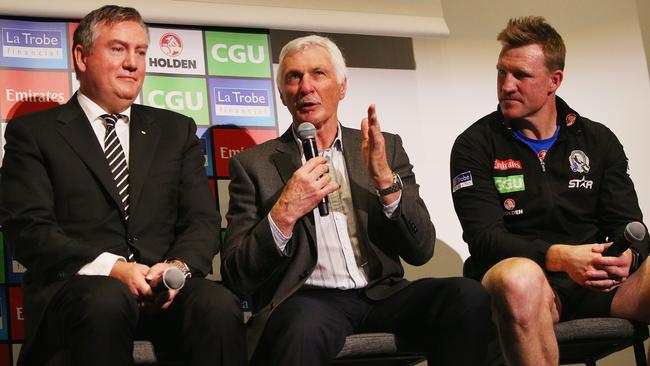
DID IT WORK?
“In some ways, it panned out beautifully,” he said.
“We played in a preliminary final (2009), won a Grand Final (2010), and we were 20 minutes off winning back-to-back flags (in 2011). People forget about this.
“The whole idea was for Mick to stay and bring through (Buckley), while we still had a good list, who could be coach for the next 10 years.
“Remembering ... we don’t cheat the salary cap, and we don’t get (AFL) advantages, you are going to get into a cycle where it goes down. But we made a preliminary final (in 2012) after the boys had to attend John McCarthy’s funeral. The next year we had shocking injuries but still made the finals.
“We fell out (of contention) after that, but we were in a rebuild. Nathan Buckley acquiesced to the board’s call to cut deep. He did what we knew we had to. So when the time came for Bucks to look for a bit of support, I am glad to say I was there to back him up.”
‘THE GREATEST DAY OF MY LIFE’, 2010
McGuire describes the day Collingwood won the 2010 premiership as the “greatest” of his life.
The reason — his family was there to see it.
Part of it was how difficult the week before had been. As the third draw in Grand Final history was played out, McGuire had to orchestrate a psyche change to convince the players and fans the ghosts of Grand Finals past hadn’t come back to haunt Collingwood.
“When (Brendon) Goddard took that mark and kicked that goal (in the draw), I don’t think I would have had anything more to give.”
But swinging into spruiker-mode he and coach Mick Malthouse sold an idea to the group that the draw meant it was “only half time”. He ensured the team went to the dinner that night — St Kilda didn’t — and the tide turned.
The 2010 replay proved Collingwood’s biggest Grand Final win from a final margin perspective, and McGuire’s “greatest day” experienced with his wife Karla and sons, Joseph and Alexander.
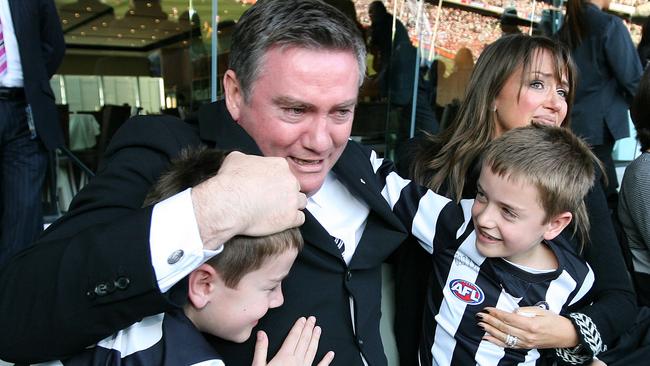
THE OFF-FIELD SUCCESSES
McGuire says the club’s philanthropic endeavours have always made him just as proud as the on-field wins.
“In many ways, that’s the reason why I have stayed (as president).”
That comes in the form of Magpie Nest Salvation Army Cafe in Melbourne, where in 2018 the aim was to provide over 4000 meals per week, as well as the accommodation of more than 300 homeless people in over 100 homes.
There are also the Indigenous and Community projects, expansion into women’s football, netball, wheelchair teams, and the club’s decision to sell its lucrative pokies.
THE ADAM GOODES/CAROLINE WILSON/HERITIER LUMUMBA CONTROVERSIES
McGuire said: “The Adam Goodes thing (in 2013) was something that happened when I was exhausted. My reputation and my history stands before that, and stands since that. If people are going to (criticise) for what was a complete slip of the tongue, that’s not my issue.
“I’ve been well embraced by Indigenous Australians and they understand what my role has been, and will continue to be.
“The Caroline Wilson thing (in 2016) was a joke that had been done all day and every day, and continues to be, including (at the MND games). In hearing it back, I felt I was out of line.”
Asked in 2020 about premiership Magpie Heritier Lumumba’s criticism of the culture during his time at the club, McGuire would say on Footy Classified: “I’m not going to get into the comments other than to say this: Heritier Lumumba was a valued member of the Collingwood Football Club — and remains to this day.”.
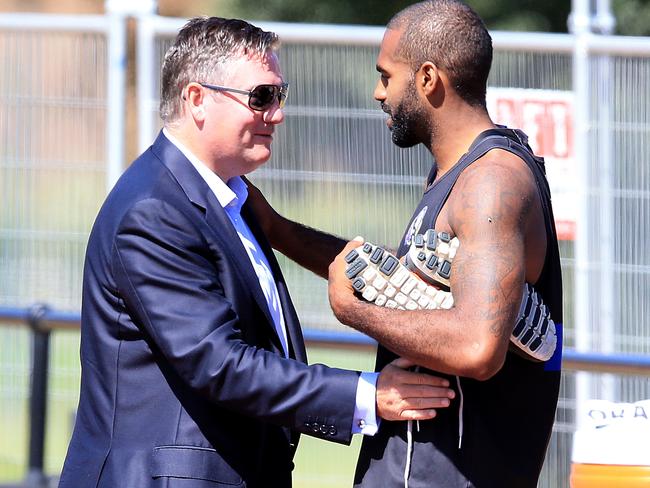
“I continually try to reach out to Heritier. In fact, earlier this year I was in Los Angeles and tried to find him, because I want to bring him home to give him a life membership at the Collingwood Football Club.
“We’re all about trying to get a solution. We’re not defending ourselves. We put ourselves out there.
“I’m really proud of what we do at Collingwood, as far as the Magpies’ Nest and what we do with our Indigenous programs. We have great leadership from Travis Varcoe, we had ‘Wellsy’ (Daniel Wells) there (in 2019), who’s just a wonderful leader in the Indigenous community. So I don’t have an issue with that.
“But if Heritier is still obviously feeling the pain, well we reach out. We want to find a solution.”
RECONTRACTING BUCKLEY, 2017, AND THE 2018 GRAND FINAL LOSS
HE maintained faith in Nathan Buckley when the pressure was on the coach in 2017, but felt he had to play “Devil’s advocate” during the club’s much publicised review.
“I believed (Buckley) was the guy, in my heart,” he says. “But I wasn’t going to say that because I didn’t want to sway the vote.
“I went Devil’s advocate without telling anyone. I said to Walshy (football manager Geoff Walsh): ‘The decision isn’t to keep or get rid of Nathan Buckley, it’s who is the best coach for us going forward’.
“I told him he had clear space to come up with his findings. When Walshy came back, he said: ‘I have gone through this and the right decision is to keep Nathan.’
McGuire said: “The easiest thing would have been to let the coach go, that’s what has traditionally happened.”
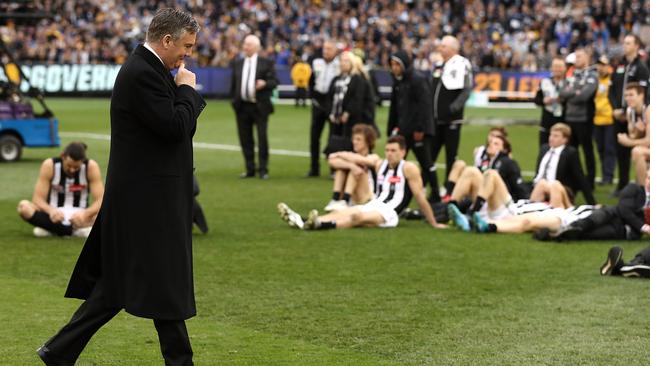
“Everyone would have said ‘Fair enough … he has had his time. (But) would I in my heart of hearts believed he had his time … I don’t think he had.”
Buckley was reappointed.
The Magpies went on to play off in the 2018 Grand Final, losing to West Coast by less than a kick, after Dom Sheed nailed a late goal.
As he said publicly after that heartbreaking loss: “We were in front for 95 per cent of the game, but the bottom line is we’re behind for eternity from here.”
“It was one of the great grand finals and we led it for all but two minutes. The Eagles were fantastic. They’ve got the cup and we walk away with a funny feeling.”
WHY EDDIE MADE RIGHT CALL TO RELINQUISH PRESIDENCY
Eddie McGuire ascended the Collingwood presidency in October 1998 — on his 34th birthday — in what was effectively a bloodless coup.
His shock announcement at Monday night’s members’ forum that he will step down at the end of next year after an extraordinary 23 seasons means he will leave of his own accord – no matter what happens next year.
It is the right call for the 56-year-old as he looks to the next phase of his life and the right call for the club as it looks to kickstart a new era.
McGuire will bow out as the third longest-serving club president in VFL-AFL history, and the Magpies’ second longest-serving president, behind Harry Curtis.
He sensed it was the right time for change for myriad reasons.
But with his uncanny knowledge of Collingwood’s often fractured political history, it wouldn’t have been lost on him that Curtis was unceremoniously voted out of office in one of the club’s most bitter elections 70 years ago — in 1950 — after a long and mostly successful reign.
No one knows if that would have happened to McGuire.
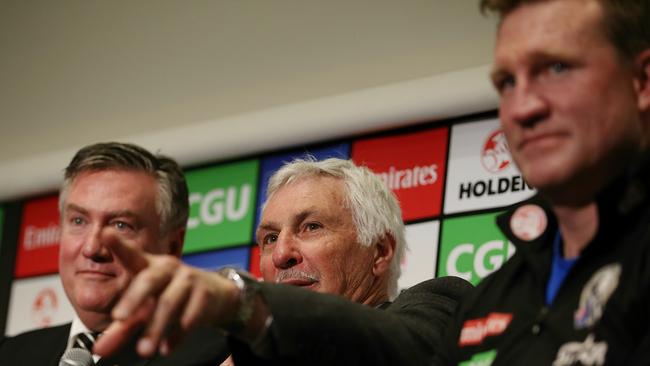
But with a handful of agitators calling for him to resign and calling for change in recent weeks, and with the club still dealing with member backlash following its controversial trade period, the prospect of a smooth transition seems assured now.
In McGuire’s first official speech as president in 1998 he set the bar high: “Tonight is a moment of truth in shaping Collingwood’s future in the 21st century.”
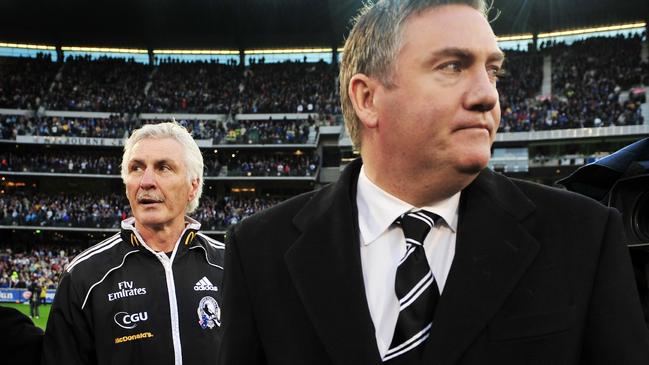
“What I can promise you from the bottom of my heart is that every decision made by the Collingwood Football Club will be made for the benefit of the club, and nothing else.”
He lived up to the promise of giving his heart and soul to Collingwood, a fact even his greatest detractors would struggle to argue against.
There have been some groundbreaking achievements across more than two decades mixed in with some controversial moments – some of them self-inflicted – that adversely impacted on him and the club.
McGuire’s fingerprints have been on some of the biggest decisions in the club’s history.
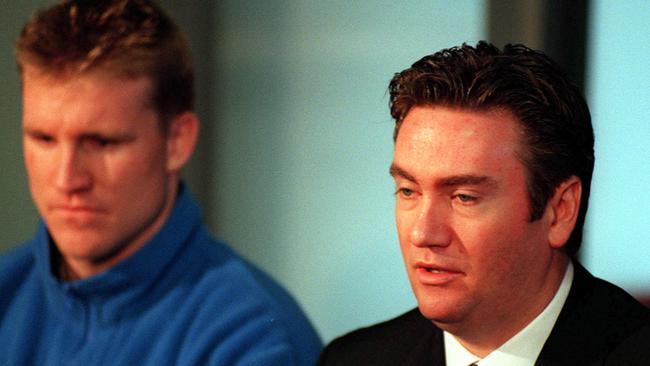
There was the resurrection of the club from a financial and football basket case in 1998, transforming it from a suburban organisation into a national brand with international sponsors.
There was the astute appointment of Mick Malthouse as senior coach in late 1999; the move from Victoria Park to Olympic Park; the securing of the club’s 15th VFL-AFL premiership in 2010; the coaching succession plan from Malthouse to Nathan Buckley (of which some still debate the pros and cons); the push to 75,000-80,000 members; the establishment of an AFLW side and national netball team; and the club’s philanthropic endeavours to feed, house and give hope to those less fortunate in the community.
But there were also significant controversies that cast a shadow over the club.
There was the Adam Goodes radio gaffe as well as ongoing legal issues and an ongoing internal review into the club’s culture following Heritier Lumumba’s claims of racism encountered during his time at the club.
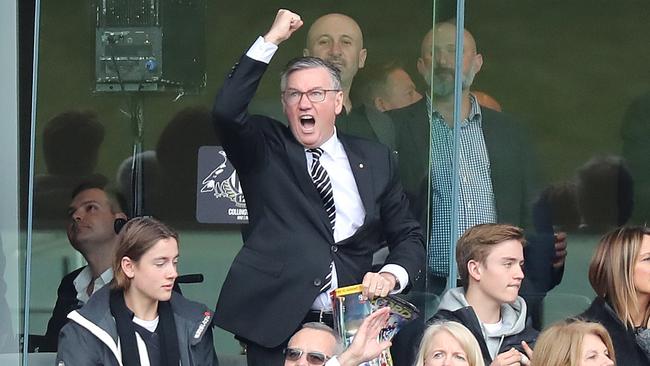
There were a few off-field discipline issues from players that embarrassed the club and the president; debate over the merit of the coaching handover; and in recent times a bulging salary cap problem that saw fan favourites Adam Treloar and Jaidyn Stephenson depart in a fire sale that infuriated the fan base before a solid draft period eased some of the tensions.
McGuire’s pledge to make Collingwood the biggest club in the AFL was realised in 2010 after the Magpies won the flag.
That mantle has since been usurped, with suburban neighbours Richmond now laying claim to it.
If it hadn’t been one of the greatest pressure kicks in football history from Dom Sheed in 2018, the Magpies might well have had cup 16 locked away in their Olympic Park trophy cabinet.
Love him or hate him, few presidents have shaped the role as much as McGuire, and for all of his perceived strengths and weaknesses, there has never been any doubt about his devotion for the club.
His presidency may be coming to end, but given his passion for the club, it is fair to assume he won’t be lost to Collingwood.




